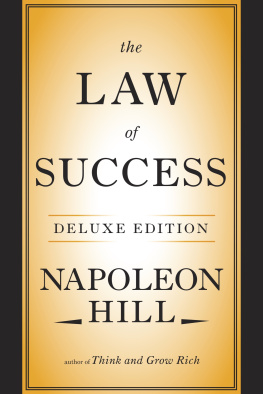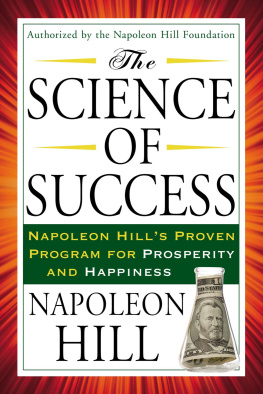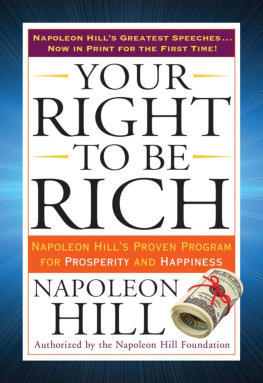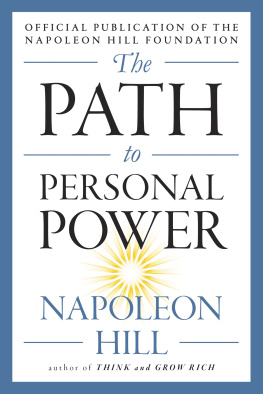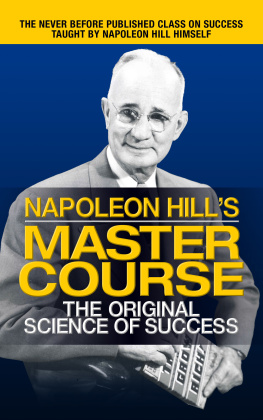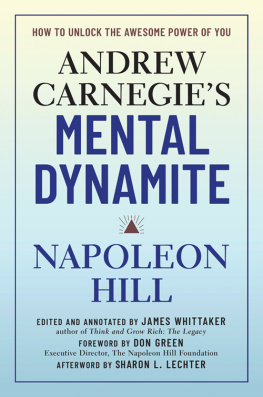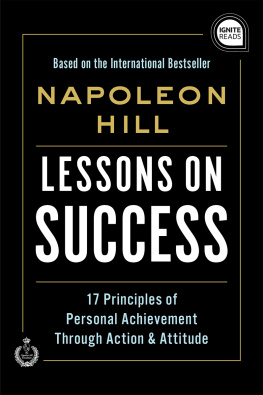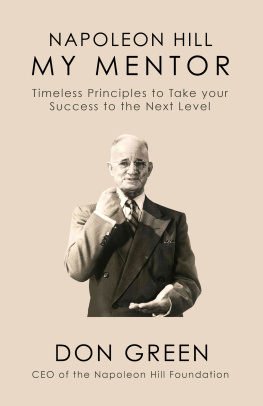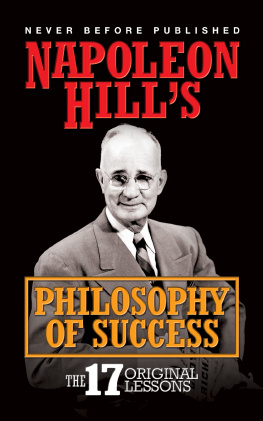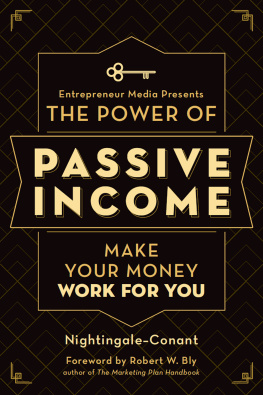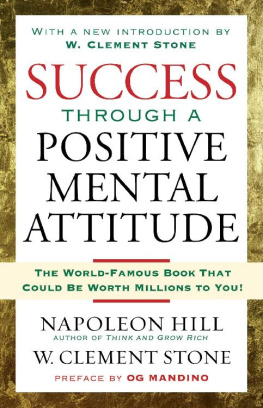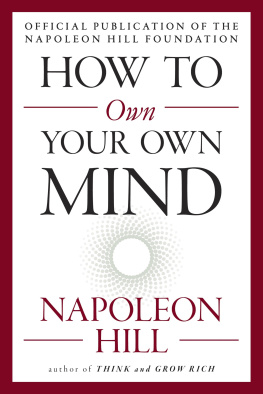Napoleon Hill was born in 1883 in Wise County,Virginia, USA, and died in 1970 after a long andsuccessful career as a consultant to business leaders,lecturer and author. Hill's all-time bestseller Think andGrow Rich, first published in 1937, made him amillionaire in his own right and, having sold 15 millioncopies worldwide, set the standard for today's motivationalthinking. Hill also established the NapoleonHill Foundation, a non-profit educational institutionwhose mission is to promote his philosophy ofleadership, self-motivation and individual achievement.
Patricia G. Horan is a 30-year veteran of New Yorkbook and magazine publishing, as well as an award-winningauthor, editor, copywriter and playwright. Shemost recently worked as an editor of Breakthrough, thequarterly journal of Global Education Associates, a UNnon-governmental organisation founded in 1973. She isthe author of 177 Favorite Poems for Children and Haiti:Vibrant Land of Joy and Sorrow.
Also by Napoleon Hill from Vermilion
Think and Grow Rich
Master Key to Riches
This eBook is copyright material and must not be copied, reproduced, transferred, distributed, leased, licensed or publicly performed or used in any way except as specifically permitted in writing by the publishers, as allowed under the terms and conditions under which it was purchased or as strictly permitted by applicable copyright law. Any unauthorised distribution or use of this text may be a direct infringement of the author's and publisher's rights and those responsible may be liable in law accordingly.
ISBN 9781407024585
Version 1.0
www.randomhouse.co.uk
1 3 5 7 9 10 8 6 4 2
Text taken from The Magic Ladder to Success, originally published 1930, andThe Law of Success, originally published 1928, by The Ralston University Press
This edition first published in 2008 by Vermilion,
an imprint of Ebury Publishing
Ebury Publishing is a Random House Group company
Copyright JMW Group Inc. 2008
This electronic book is sold subject to the condition that it shall not by way of trade or otherwise, be lent, resold, hired out, or otherwise circulated without the publisher's prior consent in any form other than that in which it is published and without a similar condition including this condition being imposed on the subsequent purchaser
The Random House Group Limited Reg. No. 954009
Addresses for companies within the Random House Group can be found at
www.rbooks.co.uk
A CIP catalogue record for this book is available from the British Library
ISBN: 9781407024585
Version 1.0
Copies are available at special rates for bulk orders.Contact the sales development team on 020 7840 8487 or visitwww.booksforpromotions.co.uk for more information.
To buy books by your favourite authors and register for offers, visithttp://www.rbooks.co.uk
FOREWORD
In this book are the success secrets of magnates, tycoons,moguls and captains of industry. They are toweringfigures whose names live in history, not in infamy.Unlike the headline-makers of today, they are geniuses,not jailbirds; winners, not whiners. They had more thanclout they had class. Though they were by no meanssaints, they were undoubtedly larger than life; oftendoing what others said couldn't be done. We need theirwisdom more than ever. They were the stuff of legends.
How did they Andrew Carnegie, AlexanderGraham Bell, Henry Ford, P.T. Barnum do it? Manyof them were born into impoverished circumstances.What personal alchemy turned their less-than-promisingbeginnings into pure gold? What is it thatmakes a winner?
Out of the same unforgiving circumstances came aman who set out to find the answers to this centralquestion. With a letter of introduction from Carnegiehimself, he found out these secrets by doing what noone had thought to do before: he asked the greatesthow they became great. In the process, against all odds,he became a winner himself. He invented motivationalwriting, ultimately finding himself listed as a peer withMarcus Aurelius, Ralph Waldo Emerson and BenFranklin.
He was five-foot-six and his name was Napoleon, butno Waterloo ever defeated him and he refused tolanguish in exile. Napoleon Hill was the guru of allsuccess gurus, and the author of the number onemotivational seller of all time, Think and Grow Rich,which would never have seen the light of day withoutthe original version of the book you are holding in yourhands. (Think and Grow Rich might not have seen thelight of success, either, if the publisher's choice of titlehad prevailed, since it would have been known as UseYour Noodle to Earn More Boodle!)
More than 40 years after it was published, a USAToday survey of business leaders named Think and GrowRich one of the most inspirational business books everand one of the five most influential books in its field.The same magical material contained in that book canbe found in this one. The Magic Ladder of Success, whichis the basis of this book, was published at the start of theGreat Depression, seven years before Think and GrowRich, so its chance at success was washed away alongwith the American economy. But the ideas in this bookproved themselves to be great, and they seeded thebetter-known book to follow. In Magic Ladder, Hill'sfamous 17 Laws of Success were tried, tested and foundto work miracles. In this new, updated version of hisbook as in the original Napoleon Hill bringstogether wisdom straight from the minds of the greatestnames in American business history, the result of 100interviews with the business giants of Hill's time.
In 1908, steel magnate Andrew Carnegie, son ofpenniless Scottish immigrants, stood in the library of his124-room New York City mansion. He took his goldwatch from his pocket and gave the young NapoleonHill a challenge. The 25-year-old reporter had beencommissioned by former Tennessee Governor RobertL. Taylor to write success stories about business leadersfor his magazine. Carnegie would be his first assignment,and the steel baron had already spent three days andnights with Hill. Carnegie saw something in Hill heliked a younger, shorter reflection of himself, perhaps and now it was his turn to ask the questions.
Would Hill be interested in compiling the beliefs andpractices of the business giants of the time into acoherent philosophy? Without any payment?
Napoleon Hill took 29 seconds to answer. 'Good,'Carnegie said as he put away his watch. 'I was planningon giving you only 60 seconds.'
Perhaps it was that incident that confirmed Hill'sbelief that 'Successful people make decisions quickly andchange them slowly. Unsuccessful people makedecisions slowly and change them often.'
Napoleon Hill would go on to become an advisor toPresident Franklin Delano Roosevelt. He later tookcredit for writing 'We have nothing to fear but fearitself' and several of FDR's famous Fireside Chats. Hislife would prove to be more a roller coaster than ayellow brick road: several of his businesses wentbankrupt, he lost jobs, and he was wrongly accused offraud and put into prison. One of his two sons wasborn without ears, and Hill's work took him awayfrom his family so much that one of his sons wasadopted by a family member.
His life was such a series of victorious failures that,when in his 50s, he marvelled that an entire decade hadgone by without his having to face a personal disaster.But Napoleon Hill, often down but never out, neverwavered from his Definite Chief Aim. He was to teachmillions around the world that even luck can bechanged and failures put to good use. How else wouldhe have known that first-hand?
'Success requires no explanation. Failure permits noalibis,' he would later say with the authority onlyexperience can offer.


